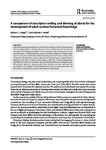A comparison of descriptive writing and drawing of plants for the development of adult novices’ botanical knowledge
| dc.contributor.author | Stagg, Bethan | |
| dc.contributor.author | Verde, Michael | |
| dc.date.accessioned | 2018-02-27T10:49:22Z | |
| dc.date.available | 2018-02-27T10:49:22Z | |
| dc.date.issued | 2019-01 | |
| dc.identifier.issn | 0021-9266 | |
| dc.identifier.issn | 2157-6009 | |
| dc.identifier.uri | http://hdl.handle.net/10026.1/10878 | |
| dc.description.abstract |
Scientific drawing and writing are critical to the development of observational and recording skills in biology. However, it is unclear how the process of drawing and writing contribute to the learning of plant taxonomy. In the present study, 41 adult botanical novices studied a suite of UK native plant species using two methods: labelled drawing and descriptive writing. Tests of species identification and recognition of morphological characteristics indicated that both methods were equally effective at improving species identification. However, drawing captured significantly more morphological information about all study species than writing and was preferred by participants. The quality of drawn and written work was also evaluated and educational implications arising from these are discussed. | |
| dc.format.extent | 63-78 | |
| dc.language | en | |
| dc.language.iso | en | |
| dc.publisher | Informa UK Limited | |
| dc.subject | Species identification | |
| dc.subject | botany | |
| dc.subject | biological drawing | |
| dc.subject | taxonomy | |
| dc.title | A comparison of descriptive writing and drawing of plants for the development of adult novices’ botanical knowledge | |
| dc.type | journal-article | |
| dc.type | Journal Article | |
| plymouth.author-url | https://www.webofscience.com/api/gateway?GWVersion=2&SrcApp=PARTNER_APP&SrcAuth=LinksAMR&KeyUT=WOS:000453706400007&DestLinkType=FullRecord&DestApp=ALL_WOS&UsrCustomerID=11bb513d99f797142bcfeffcc58ea008 | |
| plymouth.issue | 1 | |
| plymouth.volume | 53 | |
| plymouth.publication-status | Published | |
| plymouth.journal | Journal of Biological Education | |
| dc.identifier.doi | 10.1080/00219266.2017.1420683 | |
| plymouth.organisational-group | /Plymouth | |
| plymouth.organisational-group | /Plymouth/Faculty of Health | |
| plymouth.organisational-group | /Plymouth/Faculty of Health/School of Psychology | |
| plymouth.organisational-group | /Plymouth/REF 2021 Researchers by UoA | |
| plymouth.organisational-group | /Plymouth/REF 2021 Researchers by UoA/UoA04 Psychology, Psychiatry and Neuroscience | |
| plymouth.organisational-group | /Plymouth/Research Groups | |
| plymouth.organisational-group | /Plymouth/Research Groups/Centre for Brain, Cognition and Behaviour (CBCB) | |
| plymouth.organisational-group | /Plymouth/Research Groups/Centre for Brain, Cognition and Behaviour (CBCB)/Cognition | |
| plymouth.organisational-group | /Plymouth/Users by role | |
| plymouth.organisational-group | /Plymouth/Users by role/Academics | |
| dc.identifier.eissn | 2157-6009 | |
| dc.rights.embargoperiod | Not known | |
| rioxxterms.versionofrecord | 10.1080/00219266.2017.1420683 | |
| rioxxterms.licenseref.uri | http://www.rioxx.net/licenses/all-rights-reserved | |
| rioxxterms.type | Journal Article/Review |


